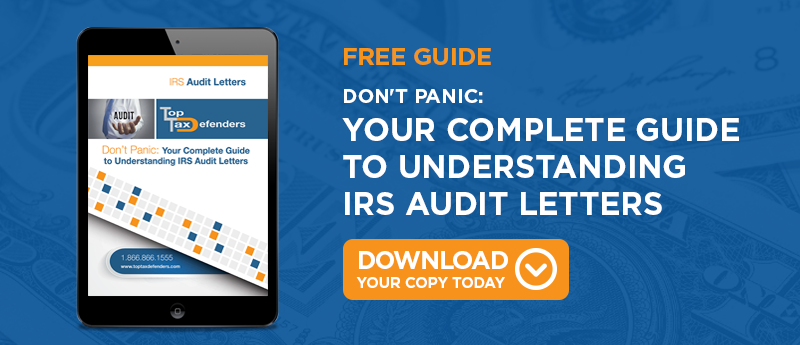
IRS audits are the worst, aren’t they? So, it pays to avoid them if at all possible. The best advice is to be entirely and totally honesty on your tax returns. Otherwise, if you follow these 10 tips, you could keep the IRS from knocking on your door in the near future.
Let’s dive in.
1. Report ALL Income
Yes, you have to report all of your income. Taking money under the table, “forgetting” about that 1099, or leaving anything off your return is a bad idea.
- Those 1099s? The IRS receives a copy, too. They expect to see it on your return.
- Are you a gambler? Report all winnings as well as losses. Don’t pad anything.
- Are you an investor? Report all of your capital gains and interest. The IRS gets most of that information, too. By the way, if you dabbled in cryptocurrency, it should be treated as an investment, not currency.
Always, always, ALWAYS file on time and file everything correctly. An amended return can trigger an audit, so be sure everything is complete before you or your tax professional hit “send.”
2. Report Overseas Accounts
If you have accounts in a foreign country, you must comply with the Foreign Account Tax Compliance Act, aka FATCA. And don’t forget about the Foreign Bank and Financial Accounts (FBAR), which files reports with the Financial Crimes and Enforcement Network (FinCEN). The movies are wrong, there is no such thing as a private Swiss Bank account where you can hide money from Uncle Sam.
Failure to comply with FATCA is a costly proposition.
3. Watch Those Deductions and Credits
Deductions and credits are great. They can lower your taxable earnings as well as the amount you owe. Just don't abuse them. The IRS knows these are popular items, and they will find out.
- Avoid claiming large itemized deductions. If your deductions are out of line with your income, the IRS notices.
- Don’t take the Earned Income Credit unless you actually qualify.
- Be honest about things like mortgage interest deductions because the IRS gets a copy of those forms, too.
- If you are self-employed, you may write off quite a bit in supplies, equipment, and costs. But don’t get carried away.
- Keep scrupulous records - you may need every supporting document possible if you do become an audit target.
We get it. Those credits and deductions look mighty tempting when you owe the feds money. But if you can’t qualify without squinting, don’t take them.
4. Take Care with Rental Losses and Real Estate Businesses
If you own rental property, you will probably suffer losses for some years. However, if your losses become a habit or are more extensive than your tax professional can stomach, be absolutely sure before you write those losses off.
The Tax Cuts and Jobs Act cut ordinary income tax rates for rental owners and kept the long-term capital gains tax for when you sell. But rental losses really complicate matters. Something else that you should know: the IRS allows you to deduct up to $25,000 in losses, but only if you actively participate in the renting of the property.
One more thing. Don't claim to be a real estate professional if you are not. To qualify, you must spend at least 750 hours a year and spend more than half your time working to be considered a real estate professional. Document every single hour you spend on your real estate business, just in case.
5. Classify Your Employees and Independent Contractors Correctly
Sure, it's tempting to call everyone who works for you an independent contractor. That way, you don't have to withhold income taxes, take care of W-2s and W-4s, or any of that other stuff. Unfortunately, if the IRS decides your “independent contractor” is actually an employee, you could be in a heap a’ trouble.
Independent contractors maintain their independent status by doing the work the way they want and when they want. You just control the finished product. When you start telling them exactly what to do, which tools to use, and when to work, they become employees.
6. Don’t Claim a Hobby as a Business
Hobbies are fun. Some of them are expensive. You may think you can save yourself some money by claiming it as a business and getting those nice business expense deductions.
Just stop. Don’t do it. If you can’t afford your hobby without defrauding Uncle Sam, maybe you need to find a different hobby. If gambling is your hobby, please refer to #1 above.
7. Don’t Claim Dependents You Don’t Have
So far, all attempts to have furbabies declared as dependents have failed. So, don’t claim Fifi on your taxes. Also, be sure your children actually count as your dependents. Things get tricky if custody is shared between divorced parents or a couple filing separately. You can’t both claim the little devils unless you file jointly.
Also, once they turn 19, you can no longer claim them unless they are full-time students. Too bad the deduction doesn't help pay off college, right?
8. Don’t Inflate Business Expenses
While you should report business expenses, don’t get too carried away. Make sure you have all the proper documentation and that you followed IRS rules.
- If you use a vehicle for business, you can deduct mileage for work travel.
- Home office supplies, equipment, and certain costs are eligible. Just be sure to follow the rules.
- Don’t try to write off meals or entertainment unless you can prove they are business-related.
As always, meticulous record-keeping is your defense.
9. Give to Charity, but Don’t Overdo It
Like business expenses, don’t inflate charitable gifts, either. (By the way, political contributions don’t count.)
For all donations, cash, goods, or services, get a receipt. Also, make a record of everything you donated.
10. Only Submit Error-Free Returns
Double and triple check your returns. You want no math errors and no blanks, especially where your signature should be. It's incredible that people do all the work of preparing a tax return and then forget to sign, but it happens.
As honesty is the best policy, make sure your reported income matches your tax documents. Don’t fall for any of the IRS Dirty Dozen tax scams that leave you holding the bag.
This isn’t an exhaustive list of ways to keep out of trouble with the U.S. government. But it can get you started down the right road. Report everything, pad nothing, and remember to sign before sending your returns.
Oh, and filing paper returns seems to get IRS attention these days, so you’d better e-file. Let us know if you need audit representation. Top Tax Defenders is here to defend you.




